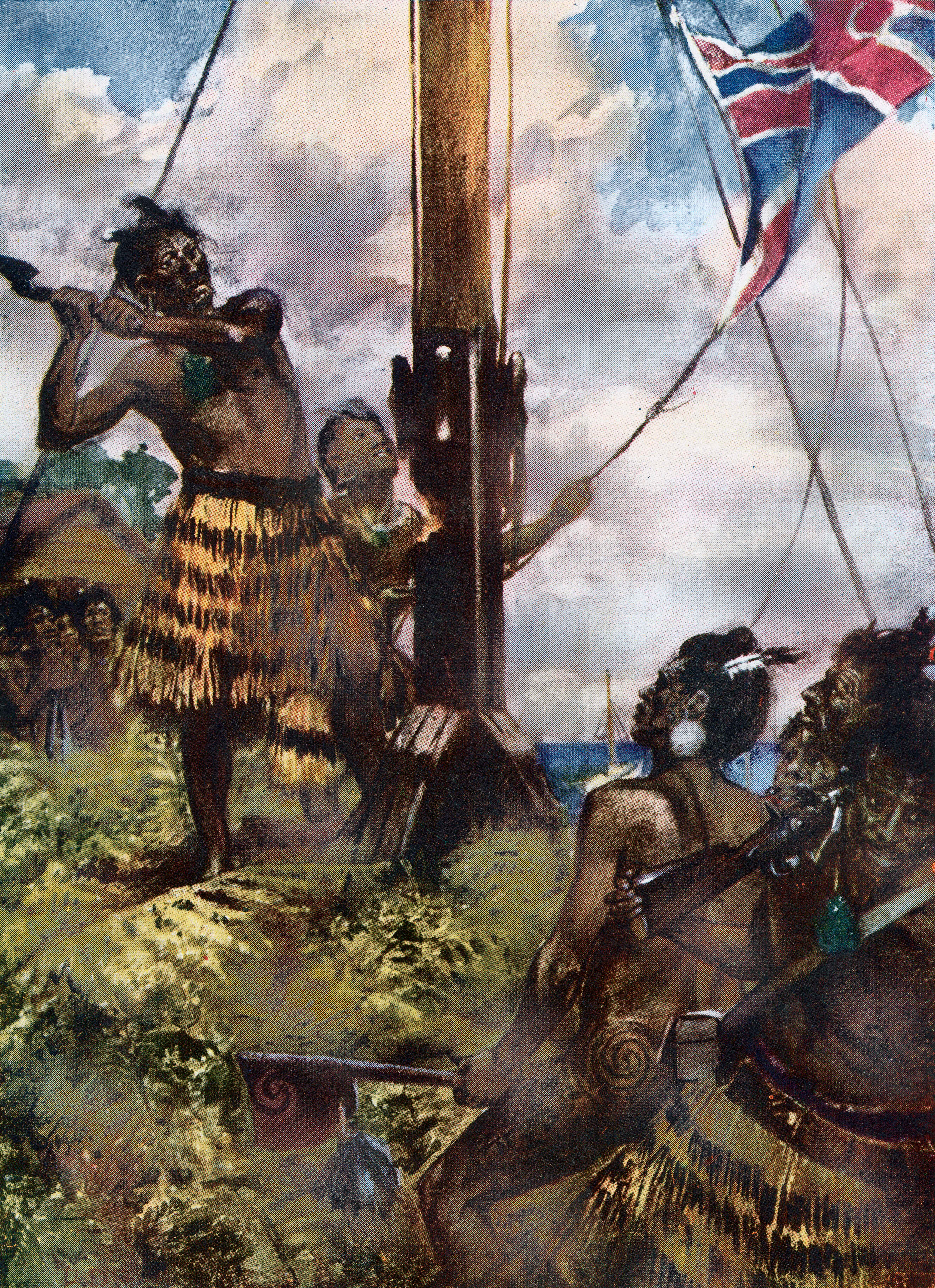|
Rūnanga
In Tikanga Māori (Māori culture or practice), a (runaka in Southern Māori dialect) is a tribal council, assembly, board or boardroom. The term can also be a verb meaning "to discuss in an assembly". An iwi (tribe) can have one governing rūnanga and many sub rūnanga, in such cases it can be used to mean the subdivision of a tribe governed by that council. It is also used for non tribal affiliations as with the CTU Runanga a sub union for Māori workers. The leader or representative of a rūnanga is sometimes referred to as Te Upoku o Te Rūnanga (literally "The head of the rūnanga"). Historical organization and practice The Rūnanga System (1861–1863) constituted a system of Māori self-government devised by Governor George Grey, to be comparable to the provinces. The plan was for them to be led by European commissioners. The system was never fully implemented and was cancelled due to the New Zealand Wars The New Zealand Wars took place from 1845 to 1872 between ... [...More Info...] [...Related Items...] OR: [Wikipedia] [Google] [Baidu] |
Māori People
The Māori (, ) are the indigenous Polynesian people of mainland New Zealand (). Māori originated with settlers from East Polynesia, who arrived in New Zealand in several waves of canoe voyages between roughly 1320 and 1350. Over several centuries in isolation, these settlers developed their own distinctive culture, whose language, mythology, crafts, and performing arts evolved independently from those of other eastern Polynesian cultures. Some early Māori moved to the Chatham Islands, where their descendants became New Zealand's other indigenous Polynesian ethnic group, the Moriori. Initial contact between Māori and Europeans, starting in the 18th century, ranged from beneficial trade to lethal violence; Māori actively adopted many technologies from the newcomers. With the signing of the Treaty of Waitangi in 1840, the two cultures coexisted for a generation. Rising tensions over disputed land sales led to conflict in the 1860s, and massive land confiscations, to which ... [...More Info...] [...Related Items...] OR: [Wikipedia] [Google] [Baidu] |
Tikanga Māori
Tikanga is a Māori concept incorporating practices and values from mātauranga Māori, Māori knowledge. Tikanga is translated into the English language with a wide range of meanings — culture, custom, ethic, etiquette, fashion, formality, lore, manner, meaning, mechanism, method, protocol, style, customary law. Māori scholar Hirini Moko Mead states that tikanga can be viewed from several perspectives. One view is that tikanga Māori 'controls interpersonal relationships' as it guides the interactions of meetings, and provides identity to individuals. Another view is through ethics, that tikanga Māori is a practised code of conduct. The word tikanga is derived from the Māori word ''tika'' meaning 'right' or 'correct' so it follows that it involves moral judgements about what is the right way of doing something. Lawyers view tikanga Māori through the lens of customary law, which comes from an authority rather than a normative system. This is being tested in the Ne ... [...More Info...] [...Related Items...] OR: [Wikipedia] [Google] [Baidu] |
Southern Māori Dialect
Southern may refer to: Businesses * China Southern Airlines, airline based in Guangzhou, China * Southern Airways, defunct US airline * Southern Air, air cargo transportation company based in Norwalk, Connecticut, US * Southern Airways Express, Memphis-based passenger air transportation company, serving eight cities in the US * Southern Company, US electricity corporation * Southern Music (now Peermusic), US record label * Southern Railway (other), various railways * Southern Records, independent British record label * Southern Studios, recording studio in London, England * Southern Television, defunct UK television company * Southern (Govia Thameslink Railway), brand used for some train services in Southern England Media * ''Southern Daily'' or '' Nanfang Daily'', the official Communist Party newspaper based in Guangdong, China * ''Southern Weekly'', a newspaper in Guangzhou, China * Heart Sussex, a radio station in Sussex, England, previously known as "Southern FM" ... [...More Info...] [...Related Items...] OR: [Wikipedia] [Google] [Baidu] |
Pearson Education
Pearson Education is a British-owned education publishing and assessment service to schools and corporations, as well for students directly. Pearson owns educational media brands including Addison–Wesley, Peachpit, Prentice Hall, eCollege, Longman, Scott Foresman, and others. Pearson is part of Pearson plc, which formerly owned the ''Financial Times''. It claims to have been formed in 1840, with the current incarnation of the company created when Pearson plc purchased the education division of Simon & Schuster (including Prentice Hall and Allyn & Bacon) from Viacom and merged it with its own education division, Addison-Wesley Longman, to form Pearson Education. Pearson Education was rebranded to Pearson in 2011 and split into an International and a North American division. Although Pearson generates approximately 60 percent of its sales in North America, it operates in more than 70 countries. Pearson International is headquartered in London, and maintains offices across ... [...More Info...] [...Related Items...] OR: [Wikipedia] [Google] [Baidu] |
Auckland University Of Technology
Auckland University of Technology (AUT) ( mi, Te Wānanga Aronui o Tāmaki Makau Rau) is a university in New Zealand, formed on 1 January 2000 when a former technical college (originally established in 1895) was granted university status. AUT is New Zealand's third largest university in terms of total student enrolment, with approximately 29,100 students enrolled across three campuses in Auckland. It has five faculties, and an additional three specialist locations: AUT Millennium, Warkworth Radio Astronomical Observatory and AUT Centre for Refugee Education. AUT enrolled more than 29,000 students in 2018, including 4,194 international students from 94 countries and 2,417 postgraduate students. AUT's student population is diverse with a range of ethnic backgrounds including New Zealand European, Asian, Māori and Pasifika. Students also represent a wide age range with 22% being aged 25–39 years and 10% being 40 or older. AUT employed 2,474 full-time equivalent (FTE) staff in ... [...More Info...] [...Related Items...] OR: [Wikipedia] [Google] [Baidu] |
George Grey
Sir George Grey, KCB (14 April 1812 – 19 September 1898) was a British soldier, explorer, colonial administrator and writer. He served in a succession of governing positions: Governor of South Australia, twice Governor of New Zealand, Governor of Cape Colony, and the 11th premier of New Zealand. He played a key role in the colonisation of New Zealand, and both the purchase and annexation of Māori land. Grey was born in Lisbon, Portugal, just a few days after his father, Lieutenant-Colonel George Grey was killed at the Battle of Badajoz in Spain. He was educated in England. After military service (1829–37) and two explorations in Western Australia (1837–39), Grey became Governor of South Australia in 1841. He oversaw the colony during a difficult formative period. Despite being less hands-on than his predecessor George Gawler, his fiscally responsible measures ensured the colony was in good shape by the time he departed for New Zealand in 1845.G. H. Pitt, "The Cri ... [...More Info...] [...Related Items...] OR: [Wikipedia] [Google] [Baidu] |
Provinces Of New Zealand
The provinces of the Colony of New Zealand existed as a form of sub-national government. Initially established in 1846 when New Zealand was a Crown colony without responsible government, two provinces ( New Ulster and New Munster) were established. Each province had its own legislative council and Governor. With the passing of the New Zealand Constitution Act 1852 the provinces were recreated around the six planned settlements or "colonies". By 1873 the number of provinces had increased to nine, but they had become less isolated from each other and demands for centralised government arose. In 1875 the New Zealand Parliament decided to abolish the provincial governments, and they came to an end in November 1876. They were superseded by counties, which were later replaced by territorial authorities. Following abolition, the provinces became known as provincial districts. Their principal legacy is the use of some provincial boundaries to determine the geographical boundaries fo ... [...More Info...] [...Related Items...] OR: [Wikipedia] [Google] [Baidu] |
New Zealand Wars
The New Zealand Wars took place from 1845 to 1872 between the New Zealand colonial government and allied Māori on one side and Māori and Māori-allied settlers on the other. They were previously commonly referred to as the Land Wars or the Māori Wars, while Māori language names for the conflicts included ("the great New Zealand wars") and ("the white man's anger"). Historian James Belich popularised the name "New Zealand Wars" in the 1980s, although according to Vincent O'Malley, the term was first used by historian James Cowan in the 1920s. Though the wars were initially localised conflicts triggered by tensions over disputed land purchases, they escalated dramatically from 1860 as the government became convinced it was facing united Māori resistance to further land sales and a refusal to acknowledge Crown sovereignty. The colonial government summoned thousands of British troops to mount major campaigns to overpower the Kīngitanga (Māori King) movement and also co ... [...More Info...] [...Related Items...] OR: [Wikipedia] [Google] [Baidu] |
Māori Words And Phrases
Māori or Maori can refer to: Relating to the Māori people * Māori people of New Zealand, or members of that group * Māori language, the language of the Māori people of New Zealand * Māori culture * Cook Islanders, the Māori people of the Cook Islands * Cook Islands Māori, the language of the Cook Islanders Ships * SS ''Maori'', a steamship of the Shaw Savill Line, shipwrecked 1909 * , a Royal Navy Tribal-class destroyer, sunk in 1915 * , a Royal Navy Tribal-class destroyer, launched 1936 and sunk 1942 * TEV ''Maori III'', a Union Steam Ship Company inter-island ferry, 1952–74 Sports teams * New Zealand Māori cricket team * New Zealand Māori rugby league team * New Zealand Māori rugby union team Other * ''Maori'', a novel by Alan Dean Foster *Mayotte Mayotte (; french: Mayotte, ; Shimaore: ''Maore'', ; Kibushi: ''Maori'', ), officially the Department of Mayotte (french: Département de Mayotte), is an overseas department and region and single territ ... [...More Info...] [...Related Items...] OR: [Wikipedia] [Google] [Baidu] |
Māori Society
Māori or Maori can refer to: Relating to the Māori people * Māori people of New Zealand, or members of that group * Māori language, the language of the Māori people of New Zealand * Māori culture * Cook Islanders, the Māori people of the Cook Islands * Cook Islands Māori, the language of the Cook Islanders Ships * SS ''Maori'', a steamship of the Shaw Savill Line, shipwrecked 1909 * , a Royal Navy Tribal-class destroyer, sunk in 1915 * , a Royal Navy Tribal-class destroyer, launched 1936 and sunk 1942 * TEV ''Maori III'', a Union Steam Ship Company inter-island ferry, 1952–74 Sports teams * New Zealand Māori cricket team * New Zealand Māori rugby league team * New Zealand Māori rugby union team Other * ''Maori'', a novel by Alan Dean Foster *Mayotte, in the Bushi language Bushi or Kibosy (''Shibushi'' or ''Kibushi'') is a dialect of Malagasy spoken in the Indian Ocean island of Mayotte. Malagasy dialects most closely related to Bushi are spoken in northwe ... [...More Info...] [...Related Items...] OR: [Wikipedia] [Google] [Baidu] |


